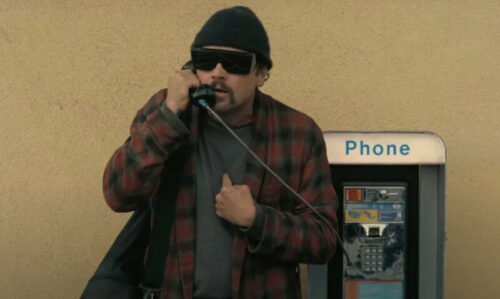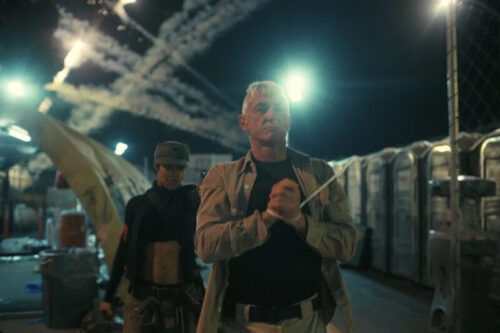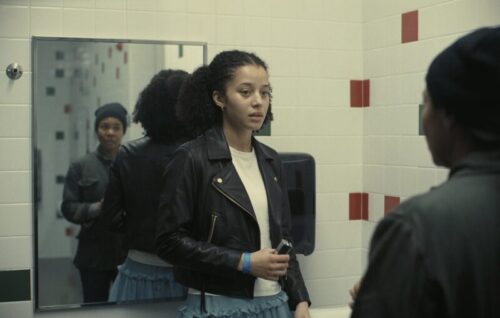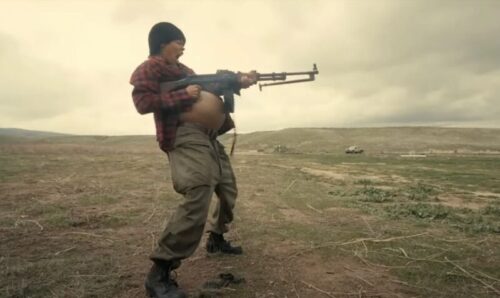What’s depressing about the modern movie landscape–okay, one of the larger, most depressing things about it–is that so few filmmakers in the Hollywood system have the status to make bigger-than-indie budgeted original movies that those made by the few who do we’re left clinging to like Titanic passengers to stray planks of wood. Even when those planks aren’t wood after all. And sink, dragging you down with them. If we happen to love cinema, are we not going to see whatever those precious few filmmakers are throwing our way? They who make high profile, big star, original stories, maybe even shot on film? Certainly we are. We must. We have no choice!
This, then, the argument inside my head when I creep forth from the safety of my lair to see a movie, shot on VistaVision, of all things, presented (near me, anyway) not in VistaVision but at least in 70mm, written/directed by Paul Thomas Anderson, whose movies I rarely like, yet here he is, making them the way they’re supposed to be made, with the love of cinema they’re supposed to be made with. I find I can’t resist, despite what results.
What results, all too often, is a movie like One Battle After Another. Anderson wanted to make an action movie. He had some story ideas he eventually wedded to elements of Thomas Pynchon’s 1990 novel Vineland, and the result is a 2.5 hour chase sequence with but a few brief pauses, watching which we learn what filmmakers have been learning for 100 years: action comes at the expense of character development (unless you’re George Miller (Anderson is not George Miller)), and nonstop action, in that it’s nonstop, is BORING.

One Battle After Another is exactly that, it’s there in the title, we’ve been warned, the movie is just one battle after another, an expression meant, notably, to convey a dreary repetitiveness, which we may presume in Anderson’s mind meant, metaphorically, that the fight against tyranny never ends, but that in the actuality of the movie means Oh my god will this never end?!
In Inherent Vice, Anderson’s last Pynchon-based movie, he went with a literal adaptation, using huge parts of the novel verbatim. While this didn’t result in much of a movie, it at least contained a fair amount of Pynchon’s humor and style. Not enough. But there it was, intriguingly, on screen for the first time. This time out, Vineland is mined for characters and some plot elements, but that’s it. The feel of Pynchon, and his humor, and his language, are gone. The humor is the biggest loss. The movie has no bounce. None except, to my surprise, for Leonardo DiCaprio, as Bob, onetime dynamiter of whatever, exactly, people are blowing up in this effectively timeless and placeless world, DiCaprio, who I’ve never been in love with as an actor, but who gives the one fun performance in the movie, and the only one with any real sense of connection to Pynchon. He’s a delight. If only this could be said of anyone else. Maybe Benicio del Toro, to an extent. He has little purpose in the story, but he’s got a deadpan commitment to dealing with the world as it is that’s just funny enough to work.

The rest of the cast is deadly, deadly serious. What are they serious about? Bombing stuff. Taking it to the man. Revolution. Against what and whom are they revolting? Unstated. The film is not set in any given time. It begins, and one imagines it’s the present, but then 16 years go by, and it’s still the present. We see people in cages at borders. Seems bad. Seems familiar. Bob and his lady, Perfidia (Teyana Taylor), bust a bunch of people out at the start of the movie…by packing them like sardines into the back of a semi? Hm. Maybe not the best plan…But forget about that, because Sean Penn plays Colonel Lockjaw as the most absurd, comically evil army guy since Chip Hazard, the plastic war action-figure in Small Soldiers. There’s some business about Perfidia forcing him to grow a big ol’ hard-on, and then he’s got a thing for her, and then he nabs her, and she, what, refuses to name names and takes her punishment like a true revolutionary? Nope, she rats out her “friends,” because of which they’re all hunted down and shot dead.
Also, she’s the mother of Willa (Chase Infiniti), whose father, Bob, raises her, once Perfidia, after ratting everyone out, splits on Lockjaw and bails to Mexico, never to be seen again.
Only wait. See, the thing is, this is a movie about family (is this how Anderson got his budget? telling execs it was all about family?). To emphasize which, Willa, age 16, at movie’s end, gets a touching letter from mom. Mom, the rat, who got her alleged friends executed, who ditched her daughter for the revolution she, it turns out, cared nothing for. Touching stuff.

The movie is on its surface about revolution, but given that the villians are a cartoon colonel and a group of Santa Claus worshipping cartoon racists, and that whatever’s being revolted against goes carefully unnamed, it’s toothless. It’s an exercise in surface. The movie, after its lengthy intro re Perfidia’s perfidiousness, quickly switches to a chase scene set 16 years later, with Lockjaw come to clean up the rest of the revolutionaries, meaning primarily Bob and Willa. Willa’s on the run, Lockjaw’s after her, and that’s the movie. Would have been nice to spend some time with Willa prior to the chase, that we might get to know her. But no such luck. We have one scene with Willa, where she yells at Bob for being a stoner goofball, and after that, the chase is on. It’s hard to care much for characters we have no investment in.
The end features a car chase to punctuate the chase scene that is the movie, and it’s here more than anywhere else that one wonders what Anderson was doing while everyone else on Earth was marveling at Fury Road. Mustn’t he have seen it? And seeing it, mustn’t he have, even if only through a fellow-film-director’s osmosis, learned something from it? Anderson’s car chase, though set on a Milleresque desert highway, is shot, it may be said, as if by a director not used to shooting car chases. In a word, it’s boring.
Anderson’s movies leave me feeling the same way every time out (but for one; I liked Phantom Thread). Each is made with the feeling of something being said, without, in the end, ever saying anything. Maybe next time I’ll stay home and watch Space Truckers (review coming soon!).

